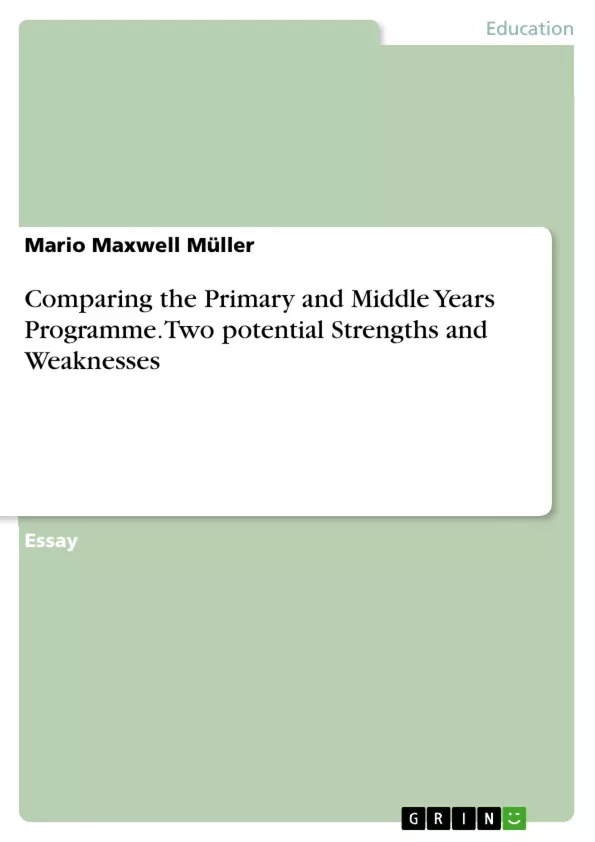The following essay will discuss the strength and weaknesses of comparing the primary and middle years programmes and how they impact them motivationally in a positive or negative way in the classroom within an international school setting. Having inquiry-based learning, especially the primary and middle years programmes can be beneficial for educators, students and parents. Having a better understanding of what instructional approaches will benefit educators and students more is imperative in order to allow progression in achieving the targets and goals set to be achieved.
Getting students to think critically promote collaboration and cooperative learning, where students are able to work within a group setting, promoting high-level order thinking, whilst being able to share ideas, opinions and perspectives with their peers.
Inhaltsverzeichnis (Table of Contents)
- Strength and weaknesses of both the PYP and MYP Programme
- Introduction
- Strengths of the PYP Programme
- Strengths of the MYP Programme
- Two weaknesses of the PYP Programme
- Two weaknesses of the MYP Programme
- Critical thinking and the way it is promoted between PYP and MYP
Zielsetzung und Themenschwerpunkte (Objectives and Key Themes)
The objective of this research essay is to explore the strengths and weaknesses of the PYP and MYP programmes, specifically in terms of their impact on student motivation and academic achievement in a diverse international school setting. The essay examines how inquiry-based learning, a core element of these programmes, can positively or negatively influence students.
- Strengths and weaknesses of the PYP and MYP programmes
- Impact of inquiry-based learning on student motivation
- Influence of the PYP and MYP programmes on academic achievement
- The role of collaboration and critical thinking in these programmes
- Assessment practices and their potential limitations
Zusammenfassung der Kapitel (Chapter Summaries)
- Introduction: This chapter introduces the research topic, focusing on the strengths and weaknesses of the PYP and MYP programmes within an international school context. It emphasizes the importance of understanding how instructional approaches can influence student motivation and academic success.
- Strengths of the PYP Programme: This section highlights the positive aspects of the PYP, including its emphasis on inquiry-based learning, student responsibility, and development of international mindedness. It emphasizes the programme's potential to foster collaboration and academic excellence.
- Strengths of the MYP Programme: This chapter explores the strengths of the MYP programme, emphasizing its continuation of inquiry-based learning and its focus on developing 21st-century skills. It also highlights the importance of the MYP exhibition as a platform for student expression and research.
- Two weaknesses of the PYP Programme: This section discusses potential limitations of the PYP, specifically regarding assessment practices. It examines how differentiated assessment approaches, while aiming for inclusivity, can sometimes present challenges in clearly measuring student progress and providing a standardized measure of achievement.
- Two weaknesses of the MYP Programme: This chapter explores potential weaknesses of the MYP programme, focusing on the challenges students may face in completing research projects and referencing their sources appropriately. It highlights the importance of supporting students in developing academic honesty and research skills.
- Critical thinking and the way it is promoted between PYP and MYP: This chapter examines how both the PYP and MYP programmes promote critical thinking skills. It explores the importance of critical thinking as a key component of the IB curriculum and highlights how it is integrated into the Approaches to Teaching and Learning (ATL) skills.
Schlüsselwörter (Keywords)
The main keywords and focus topics of this research essay include: International Baccalaureate Programme, PYP (Primary Years Programme), MYP (Middle Years Programme), inquiry-based learning, student motivation, academic achievement, collaboration, critical thinking, assessment practices, international mindedness, 21st-century skills, and research skills.
Frequently Asked Questions
What is the difference between PYP and MYP in the IB programme?
The PYP (Primary Years Programme) focuses on the foundations of inquiry and student responsibility, while the MYP (Middle Years Programme) transitions into 21st-century skills and complex research projects.
How does inquiry-based learning benefit students?
It promotes critical thinking, collaboration, and cooperative learning, allowing students to share perspectives and work effectively in group settings.
What are the potential weaknesses of the PYP assessment?
Differentiated assessment approaches in the PYP can sometimes make it challenging to clearly measure student progress using a standardized scale.
What challenges do students face in the MYP programme?
Students often struggle with completing complex research projects and maintaining academic honesty through appropriate referencing of sources.
What are "ATL skills" in the context of this study?
ATL stands for "Approaches to Teaching and Learning," which are the core skills integrated into the curriculum to promote high-level thinking and international mindedness.
- Quote paper
- Dr. Mario Maxwell Müller (Author), 2022, Comparing the Primary and Middle Years Programme. Two potential Strengths and Weaknesses, Munich, GRIN Verlag, https://www.grin.com/document/1290182



